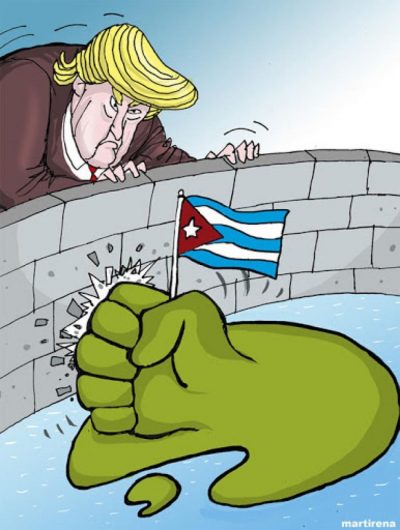Trump’s Final Act of Sabotage Against the Cuban People

All Global Research articles including the E-Book can be read in 27 languages by activating the “Translate Website” drop down menu on the top banner of our home page (Desktop version).
***
On 11 January, just a few days before the inauguration of President Joe Biden, the outgoing Trump administration made the shameless decision to return Cuba to its ‘state sponsors of terrorism’ (SST) list.
In one of his last acts as Secretary of State, Mike Pompeo cited Cuba’s refusal to extradite leaders of Colombia’s National Liberation Army (ELN) and its alleged interference in Venezuela as justification.
It is difficult to know where to start in describing the hypocrisy, fraudulence and vindictiveness of this action. There was a widespread backlash and condemnation, not only from Cuba and its close friends, but from many in the US too.
US Congressman Gregory Meeks, the incoming chairman of the House Foreign Affairs Committee, stated he was “outraged that Donald Trump is designating Cuba as a SST less than a week after he incited a domestic terror attack on the US Capitol.” The policy “focused on hurting the Cuban people – from drastically reducing remittances in the middle of a pandemic, to limiting the ability of Americans to travel to the island,” and he urged Biden to reverse it.
Biden could undo the myriad of presidential measures that Trump took against Cuba with a simple presidential directive. However, removing the country from the SST list is more complicated. It requires a formal review, which could take months, plus congressional sign-off which would meet pushback from hard line Republicans.
The designation also adds additional trade and economic sanctions to those already in place which will make companies and third countries think twice before doing business with Cuba.
The State Department’s Bureau of Western Hemisphere Affairs pushed through the decision, rather than the Counterterrorism Bureau, as would usually be expected.
Ben Rhodes, who served as Deputy National Security Adviser in the Obama administration and played a key role in normalising US-Cuba relations, tweeted that this was evidence it was politically motivated:
“This is such politicised garbage meant to tie the hands of an administration that takes power in ten days. Cuba is not a state sponsor of terrorism. Ordinary Cubans will suffer so Pompeo can look tough to a few people in Miami.”
Ine Eriksen Søreide, Norway’s Minister of Foreign Affairs questioned the reasoning behind the measure, specifically the presence of members of Colombia’s ELN in the country. Cuba has been Norway’s partner in the peace negotiations and hosted talks between the ELN and the Colombian government in Havana before talks broke down in 2019.
“If a country risks being placed on a terrorism list as a result of facilitating peace efforts, it could set a negative precedent for international peace efforts,” said Ms Eriksen Søreide.
Perhaps the most offensive part for Cubans is the fact that they themselves have been the victims of numerous terrorist attacks by US-based groups. From attacks on literacy brigades and burning of crops in the 1960s, to the mid-air bombing of a Cubana flight in 1976; from the introduction of dengue fever and swine flu into the country in the 1980s to the bombings of Cuban hotels in the 1990s; the island has suffered a long and horrific list of atrocities, many carried out by US citizens who were never prosecuted.
Such attacks have cost the lives of 3,478 people and injured 2,099. Cuban American terrorists such as Orlando Bosch and Posada Carilles both died free men in the US, protected from their crimes by a complicit State Department. The Miami Five had to leave their homeland and families to go undercover in the 90s to help protect the Cuban people because the US government failed to act.
Cuba is the antithesis of a state sponsor of terrorism. The popularity of the international campaign for their medical brigades to receive a Nobel Peace Prize, and the number of official nominations made on their behalf, illustrates the absurdity of such a claim.
Sacha Llorenti, Executive Secretary of the Bolivarian Alliance for the Peoples of Our America-Peoples’ Trade Treaty represented the thoughts of many when he described the US actions as an “affront to the peoples of the world. In the midst of a pandemic and suffering under a criminal blockade, Cuba is sending doctors and saving thousands and thousands of lives. If there were a list of countries sponsoring solidarity and life, Cuba would be in first place.”
British MP Richard Burgon described the decision to return Cuba to the list as “disgraceful” and made for “cynical political objectives based upon lies. Obama rightly removed Cuba from this classification and I hope that Joe Biden does so too, and swiftly.”
The Cuba Solidarity Campaign calls for this disgraceful designation to be reversed, together with all the extra measures against Cuba implemented by the Trump Administration. The speed with which President Biden acts on this will indicate his administration’s future intent towards the island. However, we can not settle for Obama mark 2. The blockade of Cuba remained in place, even at the height of the rapprochement between the two countries in 2016. Yet, just four years later, in 2020, the annual cost of the blockade to the Cuban economy exceeded $5 million for the first time in its history. It is the longest and most extensive set of sanctions against a country in living memory – a cruel and vindictive act of economic warfare against the Cuban people which must end now.
*
Note to readers: please click the share buttons above or below. Forward this article to your email lists. Crosspost on your blog site, internet forums. etc.
Featured image is by martirena via Cuba Solidarity Campaign

